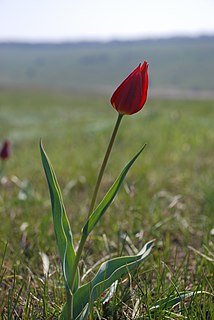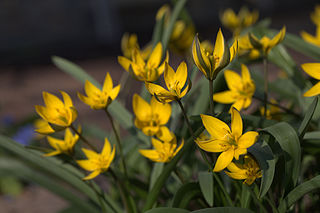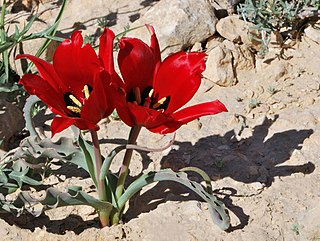
Tulips (Tulipa) form a genus of spring-blooming perennial herbaceous bulbiferous geophytes. The flowers are usually large, showy and brightly colored, generally red, pink, yellow, or white. They often have a different colored blotch at the base of the tepals, internally. Because of a degree of variability within the populations, and a long history of cultivation, classification has been complex and controversial. The tulip is a member of the lily family, Liliaceae, along with 14 other genera, where it is most closely related to Amana, Erythronium and Gagea in the tribe Lilieae. There are about 75 species, and these are divided among four subgenera. The name "tulip" is thought to be derived from a Persian word for turban, which it may have been thought to resemble. Tulips originally were found in a band stretching from Southern Europe to Central Asia, but since the seventeenth century have become widely naturalised and cultivated. In their natural state they are adapted to steppes and mountainous areas with temperate climates. Flowering in the spring, they become dormant in the summer once the flowers and leaves die back, emerging above ground as a shoot from the underground bulb in early spring.

Ajania is a genus of flowering plants in the daisy family, described as a genus in 1955. The genus is native to temperate Asia, primarily Russia and China. It is named after the Russian port city Ayan in the Khabarovsk Krai region of the Russian Far East, on the coast of the Sea of Okhotsk.
Kaschgaria is a genus of flowering plants in the daisy family.

Zinaida Petrovna Botschantzeva was a Russian botanist, cytologist, embryologist, and professor of the Tashkent university.

Iris persica, the Persian iris, is a native plant of Iran. It is particularly known for its beauty and fragrance.

Tulipa suaveolens syn. Tulipa schrenkii, van Thol tulip, Schrenck's tulip, is a bulbous herbaceous perennial of species of tulip (Tulipa) in the family of the Liliaceae. It belongs to the section tulipa. It is the probable wild ancestor of the garden tulip.

Iris graeberiana is a species in the genus Iris, in the subgenus of Scorpiris. It is a bulbous perennial.
Iris zenaidae is a species in the genus Iris, it is also in the subgenus Scorpiris. It is a bulbous perennial from Central Asia. It has deep violet-blue or cobalt blue flowers.

Tulipa neustruevae is a bulbous herbaceous perennial of species of tulip (Tulipa) in the family of the Liliaceae. It belongs to the section biflores.
Iris kuschakewiczii is a species in the genus Iris, it is also in the subgenus Scorpiris. It is a bulbous perennial, from the hills of Kazakhstan. It has dark green glaucous leaves, a short, thick stem, spring flowers in shades of purple.
Iris alexeenkoi is a plant species in the genus Iris, it is also in the subgenus Iris. It is a rhizomatous perennial, from the Caucasus mountains in Azerbaijan. It has green or greyish grass-like leaves, a short slender stem and 1–2 flowers that come in shades of purple, violet, purple-blue, or blue. It is closely related to Iris pumila. It is rarely cultivated as an ornamental plant in temperate regions.

The taxonomy of Tulipa places the genus in the family Liliaceae, and subdivides it as four subgenera, and comprises about 75 species.

Tulipa montana is a species of tulip native to the mountains of Iran and Turkmenistan. With its deep red petals it has been proposed as a candidate for the Biblical Rose of Sharon, whose identity is unknown.

Tulipa biflora, the two-flowered tulip, is a species of tulip, native to the former Yugoslavia, Crimea, Anatolia, the Caucasus, southern Russia, Egypt, the Middle East, Central Asia, Iran, Pakistan, Afghanistan and Xinjiang in China.

Tulipa fosteriana is a species of tulip, native to the Pamir Mountains and nearby areas of Afghanistan, Kyrgyzstan, Tajikistan and Uzbekistan.

Tulipa kaufmanniana, the water lily tulip, is a species of tulip native to Central Asia.

Tulipa greigii, is a species of tulip native to Central Asia and Iran.

Tulipa systola, the desert tulip, is a species of tulip native to the Middle East; Sinai, the Levant, Anatolia, Iraq and Iran. A geophyte adapted to arid conditions, it can remain dormant or produce only leaves in bad years based on environmental cues.

Tulipa praestans is a species of tulip native to the mountains of Tadzhikistan. Many well known cultivars have been formed from the original plant.














